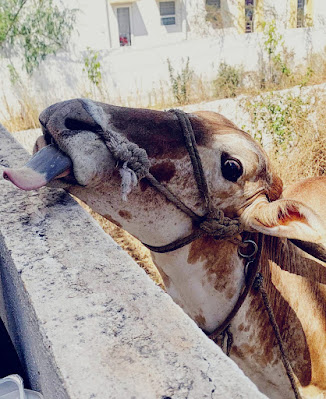We moved to our country home a few months ago because of the coronavirus. We cannot thank the virus enough.
During the lockdown, like everybody else in the world who lived in an apartment complex in a city, we were feeling a bit boxed in. Fortunately for us, a few years ago, my daughter had bought a small house in a residential layout in the middle of nowhere in Tamil Nadu. The place is about an hour’s drive from our earlier home. Six months ago, we came here for a few weeks.
Now we cannot think of going back. Or going anywhere else. Since coming here, I have been discovering new sources of happiness which I had no idea about.
We came here in the mid-summer of TTTT (the terrible twenty twenty), when it was raining heavily. In spite of the showers, a neem and a pongame we had planted a year before had been nearly dead, although the trumpetbushes (tecoma) in between the two was doing quite well. The neem was stunted; its thin trunk was covered by termites. The pongame too had been attacked by pest. Its leaves were yellow-brown and withering.The termites on the neem were driven away, ironically, by spraying neem oil. It looks a healthy, if a little wayward, adolescent tree now. Of the pongame, I snipped off the leaves until the plant looked like a skeleton. But over the last few months, she needed only regular watering to be back to her spirited best, sprouting green leaves in the spring. One of my neighbours, Mr Mohan, who is truly knowledgeable about agriculture and plants in general, tells me the seeds of Pongame (Millettia pinnata) are crushed to produce oil for lighting lamps, while the oil cake is used as manure. My neighbour also gave me some crushed pongame oil cakes mixed in water. In a few years, therefore, I hope to earn a few bucks on the side selling neem twigs for brushing teeth and oilseeds. Please remember me if you needed either of them.
A few weeks ago, we planted a chikoo (sapota). I am trying to register its English name, naseberry /ˈneɪzb(ə)ri/, in my head. Chikoo is a delicate plant. We were a little careless for a few days and she was quite dead.It showed no signs of life, but I kept watering it every evening when the sun wasn’t too hot, hoping the magic of the pongame would be repeated.
It was. Till then, I hadn’t known how much happiness the green shoots on a dead branch can give to a human being. It is no wonder that Maxim Gorky named his autobiography “In the University of Life.”
Moving from the local flora to the local fauna, a stray dog, Chintu and her two sons, Sonu and Monu are a source of immense joy for us. Chintu has twitches, which was diagnosed as distemper when a vet visited us. We have known Chintu since she was a puppy, struggling to survive in the wilderness with just a few families settled here then, which meant very little food supply for street dogs. Distemper is incurable. I don’t think Chintu will live long. Sonu and Monu, however, are handsome young lads now, and exceedingly well-behaved. I guess quite a few local female dogs will have a crush or two on them.
Our small dog Singham, a Shi Tzu who takes his name a little too seriously than he should, believes he is the Ajay Devgan of the animal kingdom. His biggest joy in life is going to the first-floor terrace and barking at all four-legged creatures he can see around: dogs, sheep, or cows 20 times his size. When we go out for walk, Chintu and her sons give us company. Singham barks at them if they come closer than 10 feet. His snooty class-consciousness makes me cringe.
The latest addition to our extended family is a cow, who I believe has a very high emotional quotient. She was tethered to a post behind our house yesterday, on the other side of the boundary wall. When she saw my wife and me, she came forward confidently, fixed a loving gaze on us, and licked my wife with her rough tongue. In a language that is species-neutral, she also told us she was bored of eating grass.
Armed with a dozen bananas, I look forward to her visit this afternoon.
11 March 2021






No comments:
Post a Comment
I will be happy to read your views, approving or otherwise. Please feel free to speak your mind. Let me add that it might take a day or two for your comments to get published.